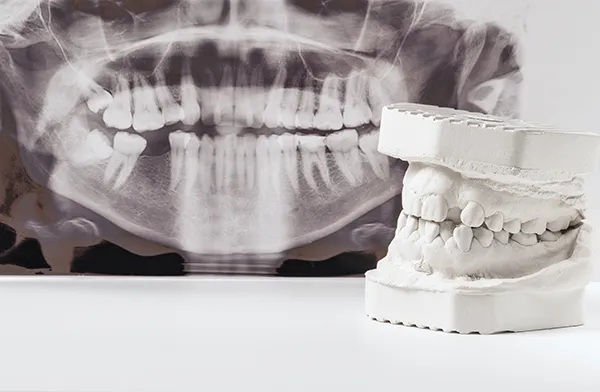What is an Impacted Tooth?
Posted on 7/1/2025 by Robert F Walker Jr. PC |
 Have you ever wondered why your teeth seem to be erupting in the wrong order, or if some are missing altogether? The answer might lie in the mysterious world of impacted teeth. Have you ever wondered why your teeth seem to be erupting in the wrong order, or if some are missing altogether? The answer might lie in the mysterious world of impacted teeth.
An impacted tooth is one that is stuck beneath the gum line or another tooth, unable to fully erupt into its proper position. This can happen with any tooth, but it's most common with wisdom teeth, followed by canines, and then premolars.
Why Do Teeth Get Impacted?
There are several reasons why teeth get impacted:
| • |
Lack of space: This is the most common reason, especially for wisdom teeth. Our jaws are simply not as big as they used to be, thanks to evolutionary changes in our diet. |
| • |
Abnormal tooth position: Sometimes, a tooth may develop in the wrong position within the jawbone, making it difficult to erupt properly. |
| • |
Extra or missing teeth: Having too many or too few teeth can also lead to crowding and impaction. |
| • |
Cysts or tumors: In rare cases, cysts or tumors can form around a developing tooth and prevent it from erupting. |
What are the Signs and Symptoms of an Impacted Tooth?
Most of the time, impacted teeth don't cause any immediate problems. However, if they become infected or push against other teeth, you may experience:
| • |
Pain: This can be a dull ache or a sharp, throbbing pain. |
| • |
Swelling: This can occur in the gums, jaw, or face. |
| • |
Redness: The gums around the impacted tooth may be red and inflamed. |
| • |
Bad breath: This can be caused by food and bacteria getting trapped around the impacted tooth. |
| • |
Difficulty opening your mouth: This can happen if the impacted tooth is pushing against other teeth. |
| • |
Damage to other teeth: An impacted tooth can put pressure on neighboring teeth, causing them to move or become damaged. |
How are Impacted Teeth Diagnosed and Treated?
Impacted teeth are usually diagnosed with an X-ray. Once diagnosed, the best course of action will depend on the specific situation. In some cases, the impacted tooth may be left alone if it is not causing any problems. However, if the impacted tooth is causing pain, infection, or other problems, it will need to be removed.
The extraction of an impacted tooth is a surgical procedure that is typically performed by an oral surgeon. The procedure can be done in an office setting or in a hospital, depending on the complexity of the case.
What are the Risks and Benefits of Impacted Tooth Removal?
As with any surgical procedure, there are some risks associated with impacted tooth removal. These risks include:
| • |
Infection: This is the most common complication, but it can usually be treated with antibiotics. |
| • |
Dry socket: This is a painful condition that can occur when the blood clot that forms after the extraction does not heal properly. |
| • |
Nerve damage: This is a rare complication that can occur if the nerve that supplies sensation to the lip or tongue is damaged during the extraction. |
| • |
Bleeding: This is usually minor and can be controlled with pressure. |
The benefits of removing an impacted tooth include:
| • |
Preventing pain and infection: This is the main reason why impacted teeth are removed. |
| • |
Preventing damage to other teeth: An impacted tooth can put pressure on neighboring teeth, causing them to move or become damaged. |
| • |
Improving oral hygiene: Impacted teeth can be difficult to clean, which can lead to tooth decay and gum disease. |
| • |
Improving the appearance of your smile: Impacted teeth can sometimes cause your teeth to be crooked or misaligned. |
What Can You Do?
If you think you may have an impacted tooth, it is important to see a dentist or oral surgeon for diagnosis and treatment. Early diagnosis and treatment can help prevent complications and improve your oral health.
|
|